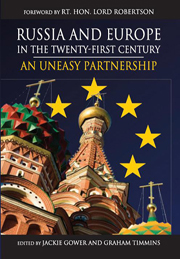Book contents
- Frontmatter
- Contents
- List of Contributors
- Acknowledgements
- List of Abbreviations/Acronyms
- Foreword Russia and Europe
- Preface
- Introduction Russia and Europe: What Kind of Partnership?
- PART 1 Russia looking West
- PART 2 Europe looking East
- PART 3 Partnership in Practice
- Chapter 13 EU-Russia Political Relations: Negotiating the Common Spaces
- Chapter 14 The Economic Relationship between Russia and the EU: History and Prospects
- Chapter 15 Russia and the European Security Governance Debate
- Conclusion Russia and Europe: An Uneasy Partnership 289
- Index
- More Titles in this series
Chapter 13 - EU-Russia Political Relations: Negotiating the Common Spaces
from PART 3 - Partnership in Practice
Published online by Cambridge University Press: 05 March 2012
- Frontmatter
- Contents
- List of Contributors
- Acknowledgements
- List of Abbreviations/Acronyms
- Foreword Russia and Europe
- Preface
- Introduction Russia and Europe: What Kind of Partnership?
- PART 1 Russia looking West
- PART 2 Europe looking East
- PART 3 Partnership in Practice
- Chapter 13 EU-Russia Political Relations: Negotiating the Common Spaces
- Chapter 14 The Economic Relationship between Russia and the EU: History and Prospects
- Chapter 15 Russia and the European Security Governance Debate
- Conclusion Russia and Europe: An Uneasy Partnership 289
- Index
- More Titles in this series
Summary
Introduction
It has been suggested that relations between the European Union (EU) and Russia can be seen as that between an elephant (being the EU) and a bear (being Russia) in the sense that there are few commonalities, few meeting points, and little common understanding. From this perspective, Russia is stuck in the nineteenth century geopolitical state-to-state thinking, while the EU approaches the external world from a unique, postmodern standpoint. The scope for misunderstanding would thus appear to be very significant.
The EU' s policy towards Russia is sometimes criticized as a failure. Some commentators argue that in fact there has not been much of a common policy at all. Member states often seem to pursue their own interests with Russia, led mainly by trade and energy considerations, to the detriment of common EU positions. While there may be elements of truth in both assertions, we will argue that EU-Russia relations have advanced significantly over the past years. Extreme scepticism is misplaced.
In the past two years, the EU and Russia have agreed to work towards increasingly close cooperation (possibly containing elements of convergence and integration in selected areas) in four broad domains that encompass nearly the whole range of the EU's multifaceted relations with Russia. These broad areas are now known as the ‘four common spaces’, which were initially agreed at the St Petersburg summit of May 2003: a Common Economic Space (CES); a Common Space of Freedom, Security and Justice; a Common Space of External Security; and a Common Space of Research and Education.
- Type
- Chapter
- Information
- Russia and Europe in the Twenty-First CenturyAn Uneasy Partnership, pp. 229 - 246Publisher: Anthem PressPrint publication year: 2007

